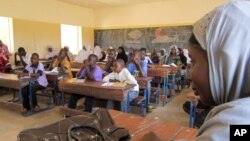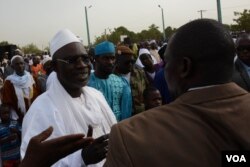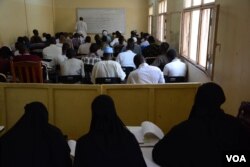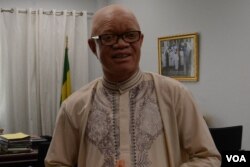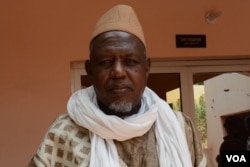Sufi Islam leaders in Mali have created a new collective to counter what they say is an influx of foreign-sponsored radical preachers and institutions courting Mali's young Muslims.
Cherif Ousmane Madani Haidara, who leads prayers at the main mosque in Segou in central Mali, has been visiting a new mosque in a different city almost every Friday. Other Sufi leaders are doing the same. They call themselves the Collective of Muslim Spirtual Leaders, or GLSM, to use the French acronym.
Haidara said there has been little oversight of religious organizations funded by foreign donors. These institutions, he said, are largely financed by money from Gulf states, and they have brought a new ideology to Mali.
In Bamako, he said, radical preachers tell youth that killing nonbelievers will give them privileges in paradise — killing one person will give you one villa, killing two gives you two villas. He said that he and other Sufi leaders were instead telling the youth that killing is not in accordance with Islamic teaching.
Aminata Diaby got the message. She traveled from the southern village of San to hear Haidara speak in Segou, and she said Haidara's message was that a true Muslim would never hurt another person, Muslim or Christian.
The GLSM said some foreign-backed organizations in Mali are espousing Wahhabi beliefs that make youth more vulnerable to radicalization.
Al-Farouk's influence
One of the most influential of these charities is Al-Farouk. Saudi diplomatic cables released last year by Wikileaks listed Al-Farouk as a group that gets funding from Saudi Arabia. Al-Farouk also gets funding from donors in Turkey, Kuwait and the United Kingdom.
The NGO has spent millions of dollars building mosques, schools and health centers in Mali. Al-Farouk helped fund the University of the Sahel in Bamako, where students receive training in Islamic studies, Arabic and computer science. Many go on to study abroad in Arabic-speaking countries, in particular Saudi Arabia.
Kadidjatou Cissé, who is in her third and final year at the University of the Sahel, said she and the other female students cover their heads and sit in the back of the classrooms, separated from the male students. She said her boyfriend was studing Sharia at a university in Riyadah and that she hoped to join him, if she can find a job and her family permits the move.
Imams around Bamako told VOA there has been increased demand for courses on Arabic and how to read and interpret the Quran.
The GLSM argues that the state needs to look more closely at what is being taught in these schools. But Mali is a secular state. The government is limited in its ability to regulate religion.
Lure of outsiders' assistance
Minister of Religious Affairs Thierno Amadou Diallo said Mali is a poor country and that the foreign donors funding schools and mosques are giving the population services that its government fails to provide. He said the outside groups' projects give a poor farmer a way to send his children to study in the Gulf.
But funding for these initiatives does warrant further scrutiny, Diallo told VOA.
Some religious leaders say more regulation is not the answer.
Mohamed Dicko, president of Mali’s High Islamic Council and an influential Wahhabi trained in Saudi Arabia and Mauritania, said, "Radicalization is not born in the mosque, it’s a state of mind.” He said that silencing preachers and stopping communities from building mosques, or depriving them of services like health clinics and education grants, would backfire and only feed extremists.
Some argue, though, that Islamic education is the best defense against extremism.
Last year, the Moroccan government opened a $20 million training school in Rabat for imams. Some 500 of the students are from Mali and are participating in a two-year program that includes instruction on how to argue against calls for terrorism and jihad.




